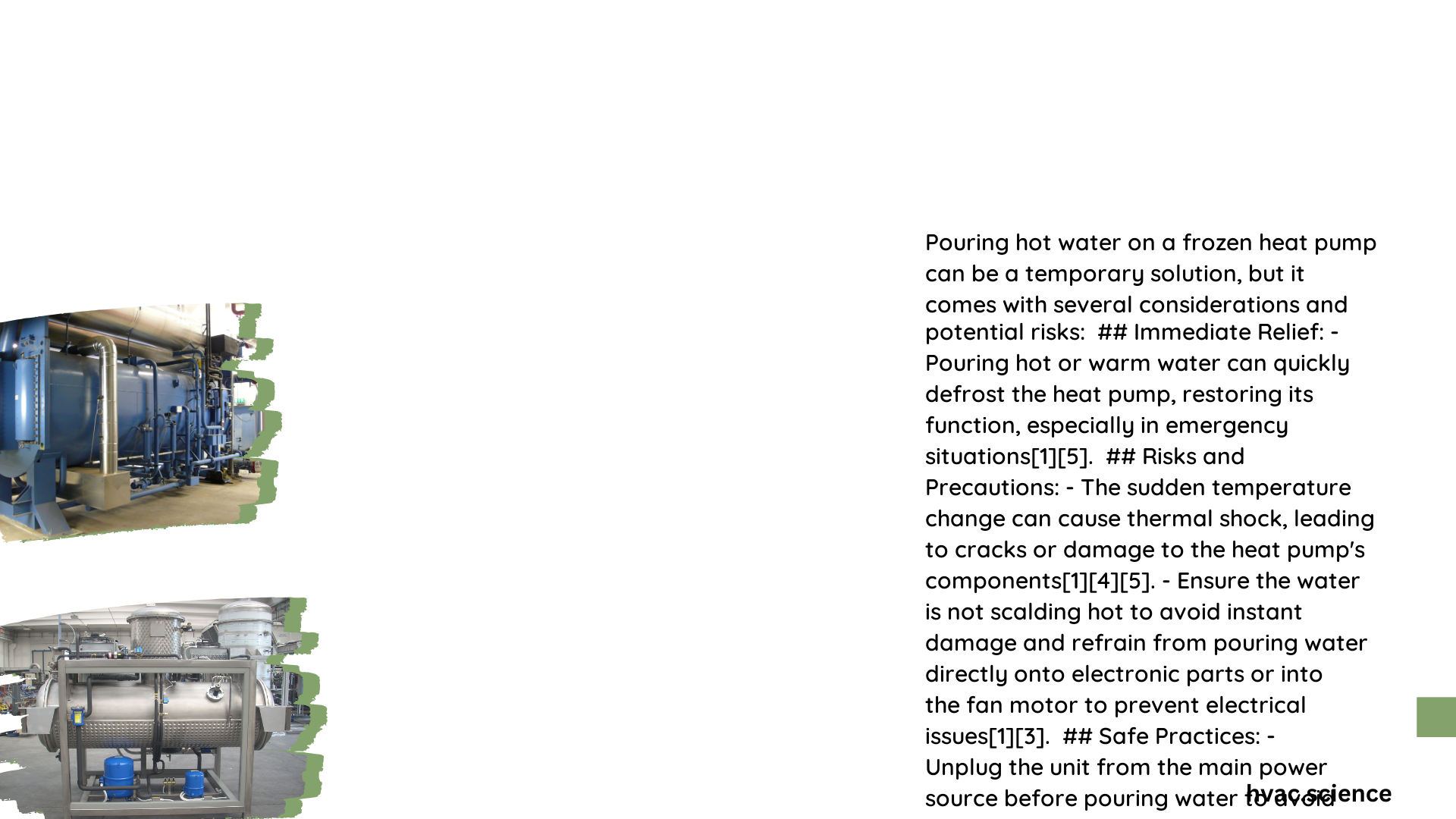Pouring hot water on a frozen heat pump is a common but potentially dangerous method for defrosting. While it may seem like a quick fix, this approach can cause severe damage to the unit and pose safety risks. Instead, safer alternatives exist that can effectively defrost your heat pump without compromising its integrity or your safety. This article explores the risks associated with using hot water and provides expert-recommended methods for safely defrosting your heat pump.
Why Do Heat Pumps Freeze?
Heat pumps can freeze due to various factors, including:
- Low outdoor temperatures
- High humidity levels
- Malfunctioning defrost cycle
- Blocked airflow
- Refrigerant leaks
Understanding these causes is crucial for preventing freezing and addressing the issue effectively when it occurs.
Is Pouring Hot Water on a Frozen Heat Pump Safe?

Pouring hot water on a frozen heat pump is not recommended for several reasons:
- Thermal Shock: The sudden temperature change can cause thermal shock, potentially cracking or damaging components.
- Electrical Hazards: Water can seep into electrical components, creating a risk of short circuits or electrical fires.
- Refreezing: If the water doesn’t drain properly, it can refreeze, exacerbating the problem.
- Inefficiency: Hot water may not effectively remove ice from all areas of the heat pump.
Given these risks, it’s essential to explore safer alternatives for defrosting your heat pump.
What Are the Safe Alternatives to Defrost a Heat Pump?
Instead of pouring hot water, consider these safer methods:
- Use the Defrost Cycle: Most modern heat pumps have a built-in defrost cycle. Activate this feature if available.
- Gentle Water Spray: Use a garden hose with lukewarm water to gently spray the unit, avoiding electrical components.
- Increase Airflow: Clear any debris or obstructions around the heat pump to improve air circulation.
- Wait for Natural Thawing: If temperatures are expected to rise, allowing the unit to thaw naturally can be effective.
How to Safely Use Water to Defrost a Heat Pump?
If you decide to use water, follow these steps:
- Turn off the power to the heat pump at the circuit breaker.
- Use lukewarm water, not hot water.
- Gently spray the frozen areas with a garden hose.
- Avoid spraying water directly into the unit or on electrical components.
- Allow the unit to dry completely before restoring power.
What Preventive Measures Can Reduce Heat Pump Freezing?
To minimize the risk of your heat pump freezing:
- Schedule regular maintenance checks
- Keep the area around the unit clear of debris
- Ensure proper drainage around the heat pump
- Install a heat pump cover or shelter
- Monitor the defrost cycle’s functionality
When Should You Call a Professional?
Consider calling an HVAC professional if:
- The heat pump freezes frequently
- You notice unusual noises or reduced performance
- The defrost cycle isn’t working properly
- There are signs of damage or wear on the unit
Professional intervention can address underlying issues and prevent future freezing problems.
What Are the Long-term Effects of Improper Defrosting Methods?
Using improper defrosting methods, such as pouring hot water, can lead to:
| Effect | Description |
|---|---|
| Reduced Efficiency | Damage to components can decrease the heat pump’s overall efficiency |
| Increased Energy Costs | A less efficient unit consumes more energy, leading to higher bills |
| Shortened Lifespan | Repeated damage can significantly reduce the heat pump’s operational life |
| Costly Repairs | Severe damage may require expensive component replacements or a full unit replacement |
How Can You Identify a Frozen Heat Pump?
Signs of a frozen heat pump include:
- Visible ice buildup on the outdoor unit
- Reduced heating or cooling performance
- Unusual noises during operation
- The unit runs constantly without reaching the desired temperature
Early detection can prevent extensive damage and allow for timely intervention.
What Role Does Climate Play in Heat Pump Freezing?
Climate significantly influences heat pump freezing:
- Cold Climates: More prone to freezing, requiring robust defrost mechanisms
- Humid Areas: Higher risk of ice formation due to moisture in the air
- Coastal Regions: Salt air can accelerate corrosion, affecting defrost components
Understanding your local climate helps in choosing appropriate preventive measures and maintenance schedules.
By following these guidelines and avoiding risky practices like pouring hot water on a frozen heat pump, you can ensure the longevity and efficiency of your heating system while maintaining safety. Regular maintenance and proper care are key to preventing freezing issues and keeping your heat pump running smoothly throughout the year.
References:
1. Snyder Air Conditioning, Plumbing & Electric: The Heat Pump Defrost Cycle Explained
2. Master Mechanical: Heat Pump: How to Defrost It During Winter
3. HVAC.com: What is heat pump defrost mode?
